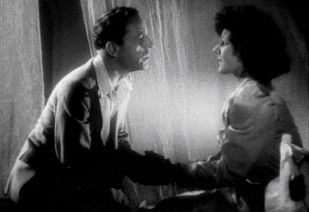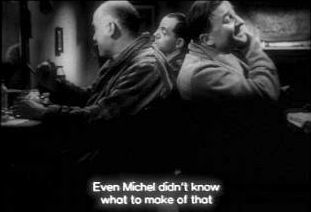
     by Dr. Kenneth Rivers -- page 2 of 4 by Dr. Kenneth Rivers -- page 2 of 4 |

A resistance fighter spills secrets to his true love, who in turn squeals to the authorities in Aventure malgache.
(© 1993 British Film Institute. All rights reserved.) |
Aventure malgache
With a script by Hitchcock and French Resistance fighter Claude Dauphin (Wood 56), Aventure malgache sets up a Good vs. Evil dichotomy at the outset, with the French Resistance Underground as the good guys and the French Vichy Government Officials in French Madagascar as the "bad guys." Of course, the German Nazis are really the bad guys, but the Vichy Government of General Pétain was collaborating with the Germans and therefore was guilty by association. The simplicity of the moral situation is undercut, however, by the complexity of the structure of the screenplay. As a framing device, the film uses a play-within-a-play concept. The real actors in this movie are French stage actors who fled France to join General de Gaulle's Free France movement in London. In the film, these actors, under the name of "The Molière Players," are seen preparing to put on a play in London. We never do find out what play they are performing, but we do see the actors putting on their makeup during rehearsals. One actor complains that he is having trouble getting a grip on how to play his character. Another actor, named Clarousse, suggests that he base his characterization on someone he happens to physically resemble--a corrupt collaborator-police official named Michel whom Clarousse had known in Madagascar. Clarousse then tells the story of how a lawyer named Clarousse led the Madagascan French Resistance against Michel's government. This story is then seen in a lengthy flashback taking up most of the film. The actor playing Clarousse the actor also plays Clarousse the lawyer. There is never any explanation as to why they have the same name or even if they are really the same person. So, if clarity is the essence of propaganda, this story gets off to a rocky start.
Fortunately, the story within the story is clearly plotted: good guy Clarousse secretly heads the Underground, smuggling freedom-loving Frenchmen out of blockaded Madagascar despite the efforts of the clumsy but sinister government. A cat-and-mouse game develops between policeman Michel and hero Clarousse, with Michel periodically jailing or coercing Clarousse, but to no avail. Clarousse continues to direct the resistance movement from his cell because Michel never realizes that a short wave radio transmitter has been built into Clarousse's alarm clock.

The camera watches as actors put on their makeup in Aventure malgache.
(© 1993 British Film Institute. All rights reserved.) |
The whole Resistance effort is nearly sunk when one of the Resisters spills some secrets to his true love, who in turn squeals to the authorities when she realizes that he loves the movement more than he loves her. Thus, a love affair, which in French is called an "aventure," nearly ruins the Underground's activities, which are also called an "aventure" in this story. Thus, the two types of adventure collide in a cautionary tale: the good Frenchman temporarily has to restrain his impulse to be a good lover if he is to be a good patriot.
One moral issue that the story very wisely sidesteps is the validity of the French claim to Madagascar. In today's post-colonial era, France's claim upon an African island, such as Madagascar, isn't convincing. But the Frenchness of the island was simply a given in 1944, at least to the movie's prospective French audience.
In trying to protect the island from the combined evil of the Germans and their Japanese allies, the Madagascan French Resistance leaders in this movie face a practical political dilemma. Unable to stand up to both the Axis powers and the Vichy authorities by themselves, the Resistance finds itself on the brink of aligning with the British. In what is by far the most interesting scene in the movie, the Resistance leaders debate their options. Clarousse quickly lays out three alternatives, which he refers to as the possible "solutions." First, they can give in to the Vichy authorities and thus, by extension, become the slaves of the Germans, whom he refers to as "the Bosch." Second, they can fight alone, and almost certainly lose, which will make them slaves of the conquering Japanese. Or third, they can "go on their knees" to the British, who have enough naval power to win the battle. Clarousse then declares that the third solution is the best, even though the English "stole the Indies and Canada" from the French, and therefore are to be dealt with cautiously.
This scene openly acknowledges the traditional suspicion and antagonism that the French people harbored toward the British and demonstrates why those feelings should be put aside in an adventurous gamble to defeat the even more sinister Axis enemies. Even if the "thieving British" do covet Madagascar, going to them on bended knee is a better deal than certain slavery at the hands of forces even more foreign and more hated. This argument would have proved effective for French audiences, but it must have sorely offended the British. Even though Hitchcock gives every indication of having understood the French mindset, he failed to deal successfully with British egos. As a result, Aventure malgache collected dust on a shelf--rarely, if ever, screened for French audiences during WWII.
page 2 of 4
 
|